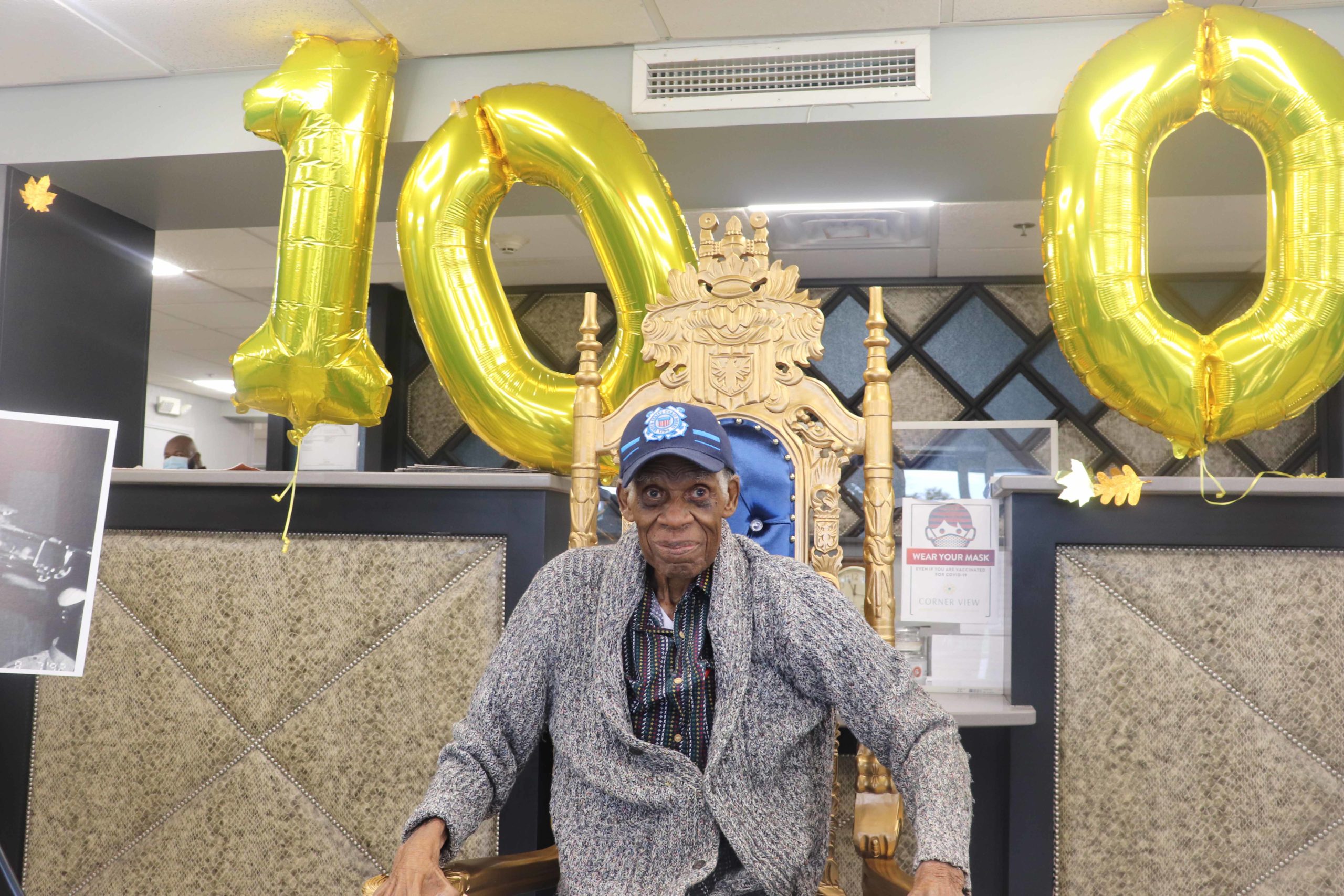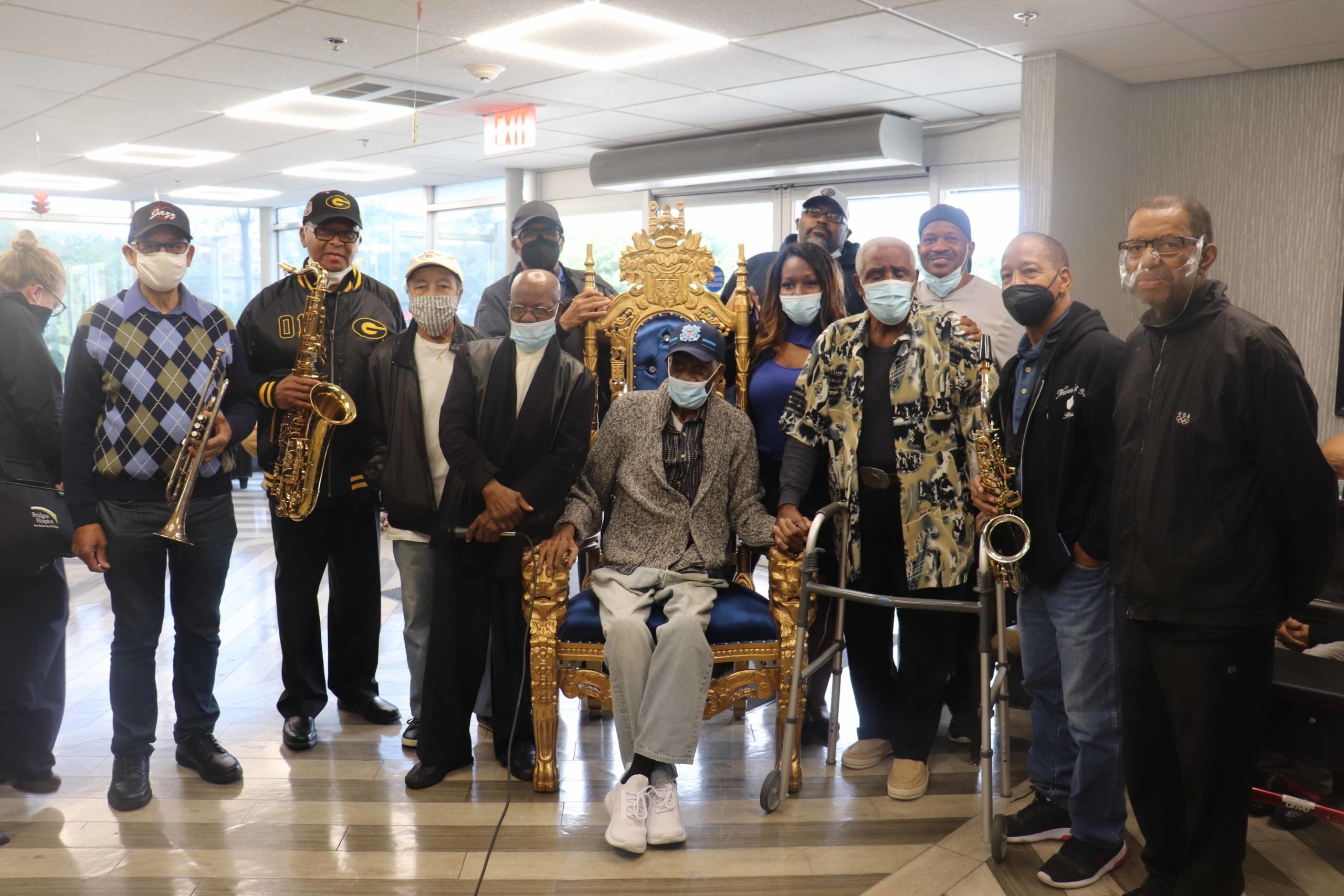HORACE LEE TURNER, who was part of the first Black band to play at Carnegie Music Hall in 1948, was the center of attention on Sept. 23 at Corner View Nursing and Rehabilitation Center, on Frankstown Ave…and for good reason. It was his 100th birthday. (Photos by Rob Taylor Jr.)
(AS TOLD TO THE NEW PITTSBURGH COURIER…)
Horace Lee Turner was born on September the 23rd, 1921, in Mobile, Alabama, Lexington Avenue.
His family moved to Pittsburgh when he was about 6 or 7 years old. They moved to the Hill District and he attended Miller School and Fifth Avenue High School.
His father brought an old bent-up King trumpet home from American Reduction where he worked. “Once I made a sound on it, I was hooked,” he said.
His teacher at Fifth Avenue encouraged him and showed him a bit. Then he studied with Cark G. McVicker Sr., a premier private teacher at Pittsburgh Musical Institute. His first time playing in public was at the Kay Boys Club on Wylie Avenue in the Hill City Band. He began to learn jazz riffs by copying a trumpet player in the neighborhood named Bradshaw.

Horace Lee Turner’s love for music was infectious and he remains an inspiration to musicians young and old.
Because Black musicians in Pittsburgh didn’t make much money, you had to have a day job or a side hustle. Horace was always an enterprising man. He opened Turner’s Record Shop at 2160 Centre Avenue. It was a very successful business for about 10 years. He went to Gateway Tech where he learned to repair radios and television sets. He accepted Bell Telephone phone bills as another way to get people to come into the shop.
In addition to the trumpet, Horace taught himself to play another eight instruments—drums, piano, bass, guitar, baritone, conga, harmonica, organ and he also sang very well. He also was a good showman who developed the act of playing the trumpet and piano at the same time. He became a successful bandleader which was an additional stream of income for him beyond his store.
He often was the preferred band to substitute for Walt Harper when Walt was double-booked because Horace knew how to please his audience, which was the secret to Harper’s success. He taught his wife, Mary, to play the drums which was an added attraction to have a woman drummer. Mary immediately became the bandleader in the public’s eye. That lasted for 30 years. When he wasn’t leading his own band, he would occasionally play as a sideman in bands like Joe Westray’s when they were playing backup for national acts like Brook Benton.
Horace was drafted into the Army and stationed at Camp Shenango in Butler, Pa. The band was attached to Deshon Hospital and he served his entire four and a half years in Butler. The band used to broadcast over WWSW Radio every Monday and he met a lot of celebrities during that time. After his discharge he enrolled in Pittsburgh Musical Institute and got his degree.
He once auditioned for Ray Charles at the 471 Musicians Club at Enterprise and Frankstown Ave., but decided not to ever go on the road based on the stories he heard from traveling musicians. Also he was playing quite a bit in Pittsburgh anyway.
He first took his niece, Pola Roberts, to gigs and she soon graduated from conga drum to a full set of drums. She became quite proficient and Stanley Turrentine took her to New York where she stayed and made some recordings before retiring from jazz.
One of his treasured memories is being a member of the first Black band to play at Carnegie Music Hall in 1948
Horace was the musical director of Jazz at the Hill House in the ‘90s. Many celebrities like Stanley Turrentine and Johnny Lytle made a point to stop by on Sundays when they were in town to jam with the locals and visit with old friends. Along with Bill Blakey, Frank “Geronimo” Battle and Travis Klein, it ran for over 10 years. Once it was broadcast on a show called “Inbound” and it went all over the world on the Internet.

HORACE LEE TURNER, with many of his fellow musicians and friends.
Horace’s love for music was infectious and he remains an inspiration to musicians young and old. The milestone of 100 productive years deserves applause and congratulations for another addition to his treasure chest of memories.
You need to be a member of Pittsburgh Jazz Network to add comments!
Join Pittsburgh Jazz Network